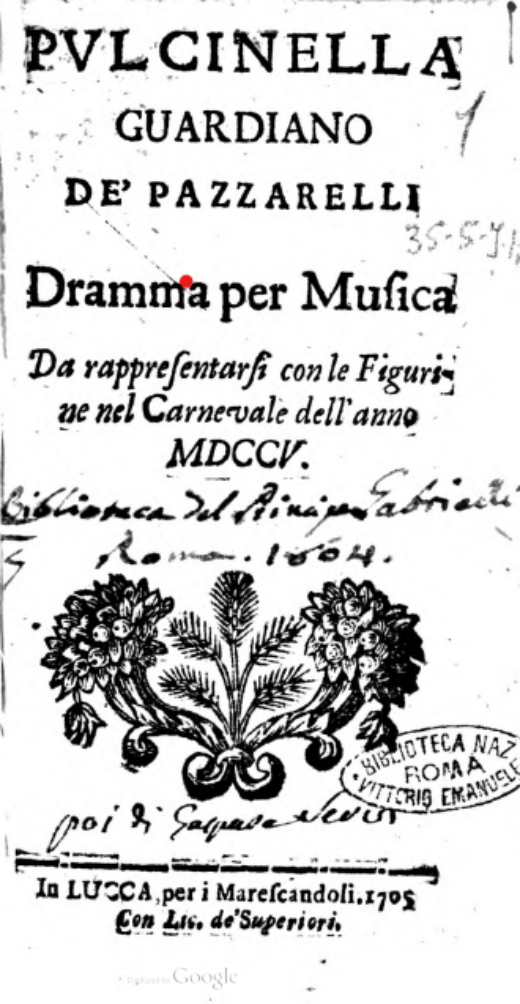
Printed
58 pages
Author(s)
Pulcinella guardiano de' pazzarelli
Pulcinella guardiano de’ pazzarelli (Pulcinella keeper of the insane) was first staged with puppets in Lucca, during the carnival of 1705. The libretto does not bear the author’s name, but Florentin Giovanni Cosimo Villifranchi is now credited with the play – even though he died in 1699. The composer is also unknown. The play was staged again in Rome in 1728, at the Teatro de’ Granari, which belonged to the Pamphili family. This is also where Pulcinella speziale in villa would later be performed with puppets.
Like other drammi per musica for puppets, which were fashionable at the end of the 17th century and in the first half of the 18th, singers performed behind the stage, while puppets were manipulated on stage.
The cast of characters accompanying Pulcinella is typical of baroque comedy: Garbina, the old matchmaker, and Pulcinella form a couple of comic visionaries; together, they contrast the heroic love story between Delia and Florante. Financial concerns are added to the plot, with Pulcinella being Corinda’s guardian. To add to the drama, the character of Vaiano embodies the archetype of the fake magician, alarming and shameless; he works in the psychiatric institution managed by Pulcinella. The second act ends with a startling scene: the dance of the spirits summoned to physically protect Pulcinella, as he is being whipped by the tail of the donkey he mounted.
A marriage is stopped by the fiancé’s first lover
Pulcinella, keeper of a psychiatric institution, is organising a ball in honour of his ward Corinda and her lover Florante. During the ball, Delia, a resident of the asylum, recognises Florante as her unfaithful ex-lover. Vaiano, a sorcerer who wants to marry Corinda, decides to stop the marriage: he tells Pulcinella that he is bound to marry his rich ward. Delia asks for Pulcinella’s help; but he believes that she is insane and in love with him. When she meets with Florante, he apologises and promises to love her: the old Garbina overhears the conversation and understands that he is about to leave Corinda.
Delia tells Vaiano about Florante’s promise; he rejoices. The sorcerer gives Pulcinella a rock that should attract Corinda's love, but Pulcinella believes that the rock is attracting Delia instead: she is still pursuing him. Believing Pulcinella, Garbina tells Florante that Delia is being unfaithful to him. Disappointed, Florante decides that he will marry Corinda, but Vaiano tells him that Corinda found a new lover: the couple quarrels. To get rid of Pulcinella, he sends him to look for a treasure and tells Garbina that Pulcinella wants to marry Corinda for her money, even though he truly loves Corinda. These fake confidences spark global confusion. In the woods, Pulcinella rides a donkey; they are surrounded by spirits and monsters.
Delia just asked for Vaiano’s help. He promises the young woman that Florante will come back to her. Pulcinella distrusts Vaiano and imagines that he wants to make him fall in love with Delia. Florante rejects Corinda, whom he believes to be in love with Vaiano; he also rejects Delia, believing that she is in love with Pulcinella despite her repeatedly denying it. Seeing Corinda walk into Vaiano’s house, he believes that she is unfaithful. When he stumbles upon Delia, chained like a madwoman, he is finally convinced of her faithfulness. The old lovers reconcile. Corinda, disappointed, reveals that she promised to marry Vaiano if Florante rejected her. Pulcinella is disappointed, but he refuses to marry Garbina.
First performance
During the Carnival
Publications and translations
Lucca : Marescandoli, 1705
